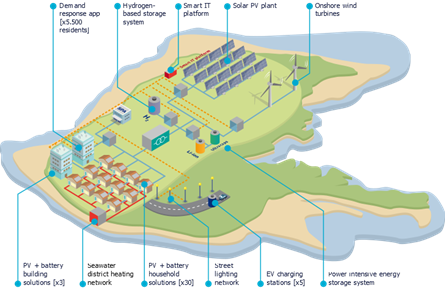
The island of Borkum at the North Sea coast of Germany has set itself the ambitious goal of becoming emission-free by 2030.
Borkum started on a path towards renewable energy many years ago. Yet the challenges associated with the intermittent nature of power supplied by such renewable sources currently remain: Consumption peaks cannot be met by solar and wind energy resulting in expensive grid electricity needing to be bought in. Vice versa, peak generation leads to energy exports in unfavourable conditions. A logical step to tackle this challenge is to investigate energy storage and its smart management, which was indeed the research objective of the previous Horizon 2020 NETfficient project (2015-2018).
ISLANDER started in October 2020 and goes one step further, paving the way for the full decarbonisation of EU islands’ energy systems by demonstrating smart grid solutions combining renewable energy production with storage technologies in real-life settings. Starting with the pilot island of Borkum, the project aims at replicating these solutions to 4 follower Islands. The key objectives of ISLANDER are as follows:
- The deployment of grid-scale ultracapacitors, Li-ion batteries, hydrogen-based storage, decentralised household and building combined photovoltaic + Li-ion battery solutions, and seawater district heating
- The development of an advanced smart IT platform using the latest mathematical optimisation techniques to aggregate and flexibly manage energy production and storage capacity, including demand response.
- The development of improved multi-scale forecasting of demand and supply relying on the recent advances of machine learning, required by the optimisation algorithms running the smart IT platform.
- The facilitation of the creation of an energy community on Borkum, that empowers local citizens to support and participate in Borkum’s energy transition, along with the integration of gender aspects, human behaviour, and socioeconomics.
- The replication of the ISLANDER results to the Follower islands and the associated archipelagos: the Scottish island of Orkney, the Greek islands of Skopelos and Lefkada, and the Croatian island of Cres
The ISLANDER website was inaugurated in March 2021, featuring news and insights about ISLANDER: www.islander-project.eu. Also, feel free to follow their social media channels LinkedIn and Twitter, to stay updated about their latest developments.
